Aptitude Test Q&A for GES Promotion - Practice 2
Multiple Choice Questions
1. The word “Pedagogy” means?
2. Pedagogy is the study of?
3. The philosopher who worked in mathematical and scientific didactic was?
4. The use of technology to enhance learning process is called __________ in education.
5. A scoring guide use to evaluate the quality of students is called __________
6. As people grow older, the __________ of learning declines.
7. Which from the following should be used to increase correct responses and appropriate behavior?
8. Which from the following should be used to decrease minor inappropriate behavior?
9. The book Emile wrote "On Education" on the nature of education and man is written by __________
10. According to Emile, the noblest work in education is to make a/an __________
11. Teachers should present information to the students clearly and in interesting way, and relate this new information to the things students __________
12. According to John Dewey, school is a __________ institution, and education is a __________ process.
13. According to John Dewey, schools must prepare students for __________
14. Responses that produce a satisfying effect in a particular situation become __________ to occur again in that situation.
15. Responses that produce a discomforting effect become __________ to occur again in that situation.
16. According to Rousseau, at what age a person ready to have a companion of the opposite sex?
17. The field of study concerned with the construction of thought processes, including remembering, problem solving, and decision-making is called __________
18. Jean Piaget proposed __________ stages of Cognitive Development.
19. The more often a particular ability is used the __________ it becomes.
20. The longer a particular ability is unused the __________ it becomes.
21. The more parts of your brain you use, the more likely you are to __________ information.
22. The conclusion of a deductive argument is __________
23. The truth of the conclusion of an inductive argument is __________
24. The process of reasoning from one or more given statements to reach a logically certain conclusion is called __________
25. The reasoning in which the given statements are viewed as supplying strong evidence for the truth of the conclusion is called __________
26. The Waldorf education approach emphasizes a balanced development of __________
27. Plato believed that talent and intelligence are __________
28. A priori knowledge is knowledge that is known independently of __________
29. A posteriori knowledge is knowledge that is known by __________
30. According to John Locke, a child’s mind does not contain any __________
31. The philosopher who for the first time mentioned the importance of play (or sports) in education was __________
32. The process of selecting units from a population to estimate characteristics of the population is called __________
33. We calculate average marks of a student in the way as we calculate __________
34. The __________ is a measure of how spreads out points are from the mean.
35. The standard deviation is the __________ of the variance.
36. The concept of pragmatism in educational philosophy says that education should be about __________
37. The idea of practical learning means education should apply to the __________
38. An aspect of pragmatism is experiential learning, which says, education should come through __________
39. According to Aristotle, virtue is a/an __________ state between excess and deficiency.
40. In case of spending money, the virtue is __________ between wastefulness.
41. The concept of perennialism in education means school curricula should focus on what is __________
42. According to John Dewey, children should experience __________ in school to make them better citizens.
43. Progressivism believes that education comes from the experience of the
44. The idea of teaching the whole child in the “philosophy of pragmatism in education” means teaching students to be good __________
45. Progressivism believes that children learn in a/an __________
46. A normal human being has __________ senses.
47. The Law of Effect can be effectively used in __________
48. Which from the following is NOT among the five senses?
49. The application of ideas, knowledge and skills to achieve the desired results is called __________
50. According to Socrates of Meno, virtue is __________
51. Rousseau advocated an educational method which consisted of removing the child from __________
52. Who advocated removing children from their mothers’ care and raising them as wards of the state?
53. The famous book “The Republic” was written by __________
54. “All who have meditated on the art of governing mankind have been convinced that the fate of empires depends on the education of youth.” This is the saying of __________
55. The study of the physical, social and mental aspects of aging is called
56. As people gets older, the ability of applying or maintain attention
57. The brain __________ as people gets older.
58. There is __________ in working memory as people gets older.
59. According to the philosophy of Idealism in education, the subject matter of curriculum should be __________
60. SPAM stands for __________
61. In education, __________ is used to make inference about the learning and development of students.
62. An assessment that is conducted prior to the start of teaching or instruction is called __________
63. An assessment that is carried out throught the course is called __________
64. An assessment is __________ if it consistently achieves the same results with the same (or similar) students.
65. A/An __________ assessment is one which measures what it is intended to measure.
66. According to the law of effect, if a stimulus results in a negative outcome, the S-R bond is
67. According to the __________, the more you do something, the better you are at it.
68. According to the __________, S-R bonds are stronger if an individual is ready to learn.
69. The __________ says, we are motivated to gain rewards and avoid punishments.
70. The Law of Effect can be effectively used in __________
71. According to the law of effect, if a stimulus results in a negative outcome, the S-R bond is __________
72. According to the __________, the more you do something, the better you are at it.
73. According to the __________, S-R bonds are stronger if an individual is ready to learn.
74. The __________ says, we are motivated to gain rewards and avoid punishments.
75. The Law of Effect can be effectively used in __________
Multiple Choice Questions
1. The word “Pedagogy” means?
2. Pedagogy is the study of?
3. The philosopher who worked in mathematical and scientific didactic was?
4. The use of technology to enhance learning process is called __________ in education.
5. A scoring guide use to evaluate the quality of students is called __________
6. As people grow older, the __________ of learning declines.
7. Which from the following should be used to increase correct responses and appropriate behavior?
8. Which from the following should be used to decrease minor inappropriate behavior?
9. The book Emile wrote "On Education" on the nature of education and man is written by __________
10. According to Emile, the noblest work in education is to make a/an __________
11. Teachers should present information to the students clearly and in interesting way, and relate this new information to the things students __________
12. According to John Dewey, school is a __________ institution, and education is a __________ process.
13. According to John Dewey, schools must prepare students for __________
14. Responses that produce a satisfying effect in a particular situation become __________ to occur again in that situation.
15. Responses that produce a discomforting effect become __________ to occur again in that situation.
16. According to Rousseau, at what age a person ready to have a companion of the opposite sex?
17. The field of study concerned with the construction of thought processes, including remembering, problem solving, and decision-making is called __________
18. Jean Piaget proposed __________ stages of Cognitive Development.
19. The more often a particular ability is used the __________ it becomes.
20. The longer a particular ability is unused the __________ it becomes.
21. The more parts of your brain you use, the more likely you are to __________ information.
22. The conclusion of a deductive argument is __________
23. The truth of the conclusion of an inductive argument is __________
24. The process of reasoning from one or more given statements to reach a logically certain conclusion is called __________
25. The reasoning in which the given statements are viewed as supplying strong evidence for the truth of the conclusion is called __________
26. The Waldorf education approach emphasizes a balanced development of __________
27. Plato believed that talent and intelligence are __________
28. A priori knowledge is knowledge that is known independently of __________
29. A posteriori knowledge is knowledge that is known by __________
30. According to John Locke, a child’s mind does not contain any __________
31. The philosopher who for the first time mentioned the importance of play (or sports) in education was __________
32. The process of selecting units from a population to estimate characteristics of the population is called __________
33. We calculate average marks of a student in the way as we calculate __________
34. The __________ is a measure of how spreads out points are from the mean.
35. The standard deviation is the __________ of the variance.
36. The concept of pragmatism in educational philosophy says that education should be about __________
37. The idea of practical learning means education should apply to the __________
38. An aspect of pragmatism is experiential learning, which says, education should come through __________
39. According to Aristotle, virtue is a/an __________ state between excess and deficiency.
40. In case of spending money, the virtue is __________ between wastefulness.
41. The concept of perennialism in education means school curricula should focus on what is __________
42. According to John Dewey, children should experience __________ in school to make them better citizens.
43. Progressivism believes that education comes from the experience of the
44. The idea of teaching the whole child in the “philosophy of pragmatism in education” means teaching students to be good __________
45. Progressivism believes that children learn in a/an __________
46. A normal human being has __________ senses.
47. The Law of Effect can be effectively used in __________
48. Which from the following is NOT among the five senses?
49. The application of ideas, knowledge and skills to achieve the desired results is called __________
50. According to Socrates of Meno, virtue is __________
51. Rousseau advocated an educational method which consisted of removing the child from __________
52. Who advocated removing children from their mothers’ care and raising them as wards of the state?
53. The famous book “The Republic” was written by __________
54. “All who have meditated on the art of governing mankind have been convinced that the fate of empires depends on the education of youth.” This is the saying of __________
55. The study of the physical, social and mental aspects of aging is called
56. As people gets older, the ability of applying or maintain attention
57. The brain __________ as people gets older.
58. There is __________ in working memory as people gets older.
59. According to the philosophy of Idealism in education, the subject matter of curriculum should be __________
60. SPAM stands for __________
61. In education, __________ is used to make inference about the learning and development of students.
62. An assessment that is conducted prior to the start of teaching or instruction is called __________
63. An assessment that is carried out throught the course is called __________
64. An assessment is __________ if it consistently achieves the same results with the same (or similar) students.
65. A/An __________ assessment is one which measures what it is intended to measure.
66. According to the law of effect, if a stimulus results in a negative outcome, the S-R bond is
67. According to the __________, the more you do something, the better you are at it.
68. According to the __________, S-R bonds are stronger if an individual is ready to learn.
69. The __________ says, we are motivated to gain rewards and avoid punishments.
70. The Law of Effect can be effectively used in __________
71. According to the law of effect, if a stimulus results in a negative outcome, the S-R bond is __________
72. According to the __________, the more you do something, the better you are at it.
73. According to the __________, S-R bonds are stronger if an individual is ready to learn.
74. The __________ says, we are motivated to gain rewards and avoid punishments.
75. The Law of Effect can be effectively used in __________


.png)





























Comments
Post a Comment